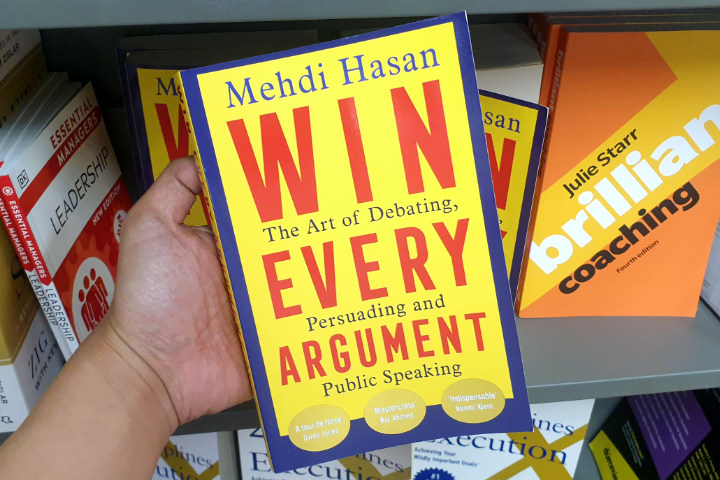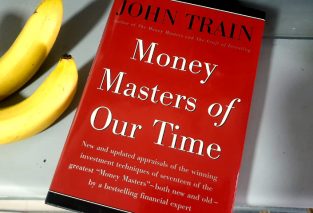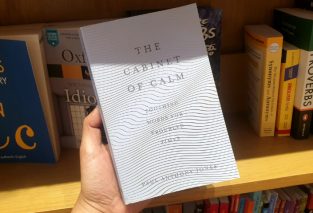An informative guide that offers practical techniques to persuade effectively, using logic, emotion, and rhetoric. It empowers readers to present arguments confidently and sway opinions in both personal and professional settings.

In the labyrinth of discourse where voices clash and opinions spar, Mehdi Hasan’s “Win Every Argument” serves as a guidebook, a veritable compass for navigating the turbulent seas of debate.
He is a seasoned journalist known for his incisive interrogations. And this work distills his experiences into a manual for mastering the art of persuasion.
At its core, the book is a celebration of rhetoric’s power. It deftly explores the nuances of argumentation, from the eloquence of ethos to the logical gymnastics of logos.
With a narrative style that is both engaging and informative, stitching anecdotes with analytical depth.
As readers embark on this journey, they are invited to reconsider the very essence of debate. Not merely as a contest of words but as a dance of intellect and empathy.
The book unfolds like a strategic playbook, offering insights into the mechanics of argumentation with the precision of a maestro orchestrating a symphony.
It dismantles the mechanics of persuasive conversation with the precision of a seasoned debater and the patience of a skilled tutor.
With this book, the author offers both a practical guide and a profound exploration of the tools needed to excel in the often messy world of discussions, debates, and disagreements.
A brilliant mix of psychological insight, intellectual rigor, and accessible instruction, making it a must-read for anyone seeking to sharpen their verbal and mental acuity.
Readers will gain access to a blueprint for becoming formidable in the art of persuasion without resorting to tricks, fallacies, or unfair tactics.
The beauty of Hasan’s approach lies in his commitment to grounding argumentation in ethics, rather than merely focusing on winning at all costs.
The opening chapters invite readers to rethink the very nature of argument. Replacing the traditional view of it as a competitive sport with a more refined perception.
Arguments are not battlegrounds for ego, but opportunities for the exchange of ideas, where the goal is not to “win” in a hollow sense but to reveal truths and clarify misunderstandings.
It deftly explains how so many people, whether on social media or in personal encounters, fall prey to the temptation of one-upping their opponents instead of seeking genuine dialogue.
The book reminds us that arguments are supposed to be about “finding” truth, not “proving” one’s own righteousness.
It’s an especially welcome stance in a time where so much of public discourse feels like a race to the bottom, with winners crowned not for their logic but for their ability to shout the loudest.
It compellingly points out that learning how to persuade effectively is not only about presenting facts but doing so in a way that is intellectually and morally honest.
Something that the world really needs more of.
One of the key tools emphasized is the importance of being able to “read” your opponent’s argument.
This might seem simple at first glance, but in truth, it’s a deeply complex skill.
A good debater needs to understand not just what their opponent is saying, but why they are saying it, the underlying assumptions at play, and how they might manipulate language or logic to win the crowd’s favor.
The book stresses the need for intellectual empathy, encouraging readers to resist the temptation to simply prepare their next response while the other person is speaking.
Instead, it advocates for truly listening. To grasp the substance, context, and emotional undercurrents of the argument at hand.
This focus on active listening isn’t just a strategy for winning, but a recognition that to engage with the world’s arguments in a meaningful way, we need to approach conversations with curiosity rather than defensiveness.
I can see readers finding that the message is both timeless and radical, urging us to break free from knee-jerk reactions and consider that even our opponents might have something worthwhile to offer.
Perhaps the most compelling aspect of the book is its ability to merge practical tools with a deep ethical foundation.
Complex rhetorical strategies are broken down into digestible morsels, empowering readers to harness these tools in their own debates.
With each page, the audience is equipped with the skills to not only articulate their positions compellingly but also to anticipate and dismantle opposing arguments. It’s like watching a chess master reveal his secrets, move by move, until every piece on the board makes perfect sense.
There are a wealth of strategies for navigating complex arguments.
Whether about politics, philosophy, or even personal relationships. There are also specific tactics, such as identifying and challenging logical fallacies, dissecting loaded language, and steering the conversation away from ad hominem attacks. But the brilliance of it all is that it doesn’t simply teach you how to win an argument. It trains you to recognize the moral responsibility that comes with wielding the power of persuasion.
It’s one thing to master techniques in theory, but it’s another to wield them with integrity and discernment.
In this sense, Win Every Argument is as much about personal development as it is about intellectual triumph.
Readers are also introduced to the tools of persuasion. Consisting of methods of appealing to reason, emotion, and shared values.
It draws from a broad range of sources, from classical rhetoric to modern communication theory, making his advice accessible to a wide audience.
It also teaches how to effectively frame your arguments so they resonate with diverse listeners. How to use stories and anecdotes to humanize abstract concepts. And how to remain calm and composed even when the discussion gets heated.
Each chapter is filled with examples that illustrate not only the “how” but also the “why” behind each technique, making it easy for the reader to integrate these lessons into their own lives.
We must also learn to acknowledge the importance of personal biases in argumentation, showing how we must first recognize our own limitations before engaging with others.
After all, if we can’t control our own biases, how can we hope to effectively challenge those of others?
Shortcomings
Still, while golden book offers a masterclass in argumentation, it is not without its flaws.
The book’s main strength, which is its emphasis on ethics and moral responsibility in debate, can also be seen as a potential drawback.
For some readers, especially those more inclined toward adversarial thinking, the book’s emphasis on empathy, active listening, and self-awareness may feel like a plea for avoiding the “real” battle of winning arguments.
This could make it seem less applicable to those who view debate as a competition, with only one victor at the end.
A mentality that is very widespread in the competitive environment that businesses and individuals operate in today. And it’s present in both work and social settings.
Furthermore, the book’s reliance on examples drawn largely from public debates and media exchanges might leave some feeling that its advice is more suited for professional settings than personal, day-to-day interactions. Such setting are also heavily influenced by the audience factor.
How do these high-level strategies translate when it comes to arguing with a spouse over something like the thermostat setting or a colleague about who took the last cup of coffee?
Some might wish for more practical guidance on navigating these more mundane, but no less heated, types of disagreements.
One might also critique the book for occasionally glossing over the ethical dimensions of debate. A potential pitfall for those who wield these techniques without discernment.
A deeper exploration into the ethics of persuasion could enhance the book’s applicability, reminding readers that with great power comes great responsibility.
Biggest Takeaway
The book is more than the art of argumentation, but rather the importance of learning how to engage thoughtfully with differing viewpoints.
Our world is increasingly defined by polarized discourse. Hasan’s approach offers a path toward more respectful, productive conversations.
It’s an invitation to push past surface-level exchanges and dig deeper into the why and how of disagreements, ultimately striving for understanding rather than domination.
The book also succeeds in reminding us that the point of an argument should never be to “defeat” the other person, but to elevate the conversation to a place where all participants can walk away with greater insight.
The advice is the intellectual equivalent of adding seasoning to a dish. Not just for flavor, but to bring out the hidden depths of the ingredients.
After all, when you really think about it, sometimes the best way to win an argument is to remember that there’s no point in arguing if you don’t leave room for growth.
Readers are not merely passive recipients of knowledge. They are active participants in a transformative process.
The insights in the book have the potential to elevate everyday conversations into meaningful exchanges, where ideas are not only shared but truly understood.
Remember. That when it comes to winning arguments, it’s not just about making a point. It’s about mastering the pointillism of discourse itself.




